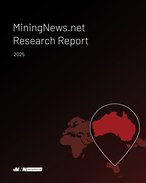Peak worked with Patersons Securities to complete the raising at 4c, just below the last trading price of 4.5c, valuing the company at around $27 million.
CEO Rocky Smith said there was strong interest from investors now that Tanzania is able to now process Peak's special mining licence, following the long-awaited establishment of a new mining commission last week.
The Ngualla resource is described by Peak as one of the world's largest and highest grade neodymium and praseodymium projects, and has a forecast 26-year life backed by a positive 2017 bankable feasibility study.
Peak, which argues the Tees Valley refinery location in the UK makes it the lowest operating and capital cost project of any comparable rare earth developer globally.
Some 86 million new shares will be issued for an initial $3.4 million, while shareholder approval will be required for the second tranche of 71.5 million shares for an additional $2.86 million, including $240,000 million worth of shares subscribed by directors and staff.
Every three placement shares come with a free 6c option, exercisable within two years.
The cash will be used to advance Peak's share of the Ngualla and Teesside refinery costs, including permitting and license applications; various costs associated with marketing and negotiating for offtake and project financing; some debt retirement and general expenses.
Amid a rising trend for NdPr, particularly out of China, is the role for the rare earths in electric vehicles, with up to 1kg of material needed per vehicle.
Demand is expected to double by 2025, Peak said.
The company needs to convince the Tanzanian government that its US$200 million, 711,000tpa proposed development will process the rare earths to the level required by legislation, so it can then ship the concentrate to a $165 million refinery in the UK where it will produce 2810tpa of NdPr, 7995pa of lanthanum, 3475tpa cerium and 625tpa of heavy rare earths.
Peak owns 75% of the project with Appian Natural Resources fund holding the balance.
The company had $561,000 at the start of the year.



